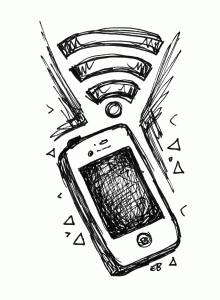 If you’ve been a mobile phone user over the last couple years, you may have noticed some suspiciously bribe-y advertisements coming from your carrier. Switch from your unlimited plan, they say, and we’ll give you a new upgrade! A new phone! More minutes! More coverage! For the love of god, just drop your plan.
If you’ve been a mobile phone user over the last couple years, you may have noticed some suspiciously bribe-y advertisements coming from your carrier. Switch from your unlimited plan, they say, and we’ll give you a new upgrade! A new phone! More minutes! More coverage! For the love of god, just drop your plan.
You might be wondering what the big deal is about having unlimited data; you pay them, you get coverage, that’s the way it’s always worked. I mean, it’s wireless right? Just signals going through the air. It’s not like you can have too many – or can you?
Mobile phones, along with radios, television, and more or less everything wireless, function by sending out a range of electromagnetic frequencies. For a while, the data-sending frequencies really did seem free, and got handed out left and right as exclusive privileges to whoever wanted to broadcast until eventually the entire usable electromagnetic range was accounted for.
Before the age of wireless really took hold, television took up only a very small space to send its signals – a whole channel used only a tiny share of bandwidth. In addition, the cost of spectrum was low enough that companies bought up huge surpluses for no reason other than to sequester it for themselves.
These were the years before smartphones, before everyone and their grandma needed to watch Youtube videos on the subway, surf Google during boring business meetings, and post their Flappy Bird scores in the middle of a swiftly-getting-awkward dinner date. The fact that future smartphones and tablets would utilize almost 3,000 times more data than the tiny cells of the ‘90s was unthinkable, as was the prospect of actually running out of bandwidths to use.
It’s only now – a decade and a half later – that we’re starting to run into hard caps. And it’s the cell companies that have the worst of it – while usage levels by tablets and phones have gone up, TV has actually decreased in favor of the advantages of cable, leaving the few original television and radio broadcasters with a vast hold over the spectrum of bandwidths – jealously guarding their long-time holdings even as they feel no need to use them.
Publicly, they say they’re holding out for a mobile broadcasting revolution for when sending TV to phones and tablets will be common and they’ll suddenly need their vast expanses of hoarded frequency (though why anyone would go back to cable television with options like Netflix or Hulu is questionable at best).
Privately, they insist that the cell companies do more with what they have, an expensive process requiring the installation of more cell towers and higher complexity networking. That’s not working out so well for the cell companies, hence the sudden shift in attitudes toward your unlimited plan – every day you keep it, you’re cutting a bigger and more unpredictable hole in what remains of their limited bandwidth supply.
It’s not entirely clear what the future of the broadcasting jam will be, but it’ll most assuredly get worse before it gets better, and it may not get better for a while.
Even if the mobile video revolution ends up a flop, for now the broadcasting companies aren’t budging and new innovations, like communicating vehicles and infrastructure, threaten to impose even more data demands on the already strained system. The American mobile industry is already at 80% capacity, and it’s expected that we’ll max out within the decade unless major changes are made.
So for now, you can do whatever you want to try and hold on to that unlimited plan – whether that means using a five-year-old phone, passing up on messaging data, or enduring service as unreliable as your grandmother’s hearing aid.
But don’t expect to be able to be struggling with it for much longer. You’ll have to endure the full cost of a bigger plan, or even put the phone down once in a while. That Flappy Bird score will just have to stay your little secret.
Copeland is a member of the class of 2015.




